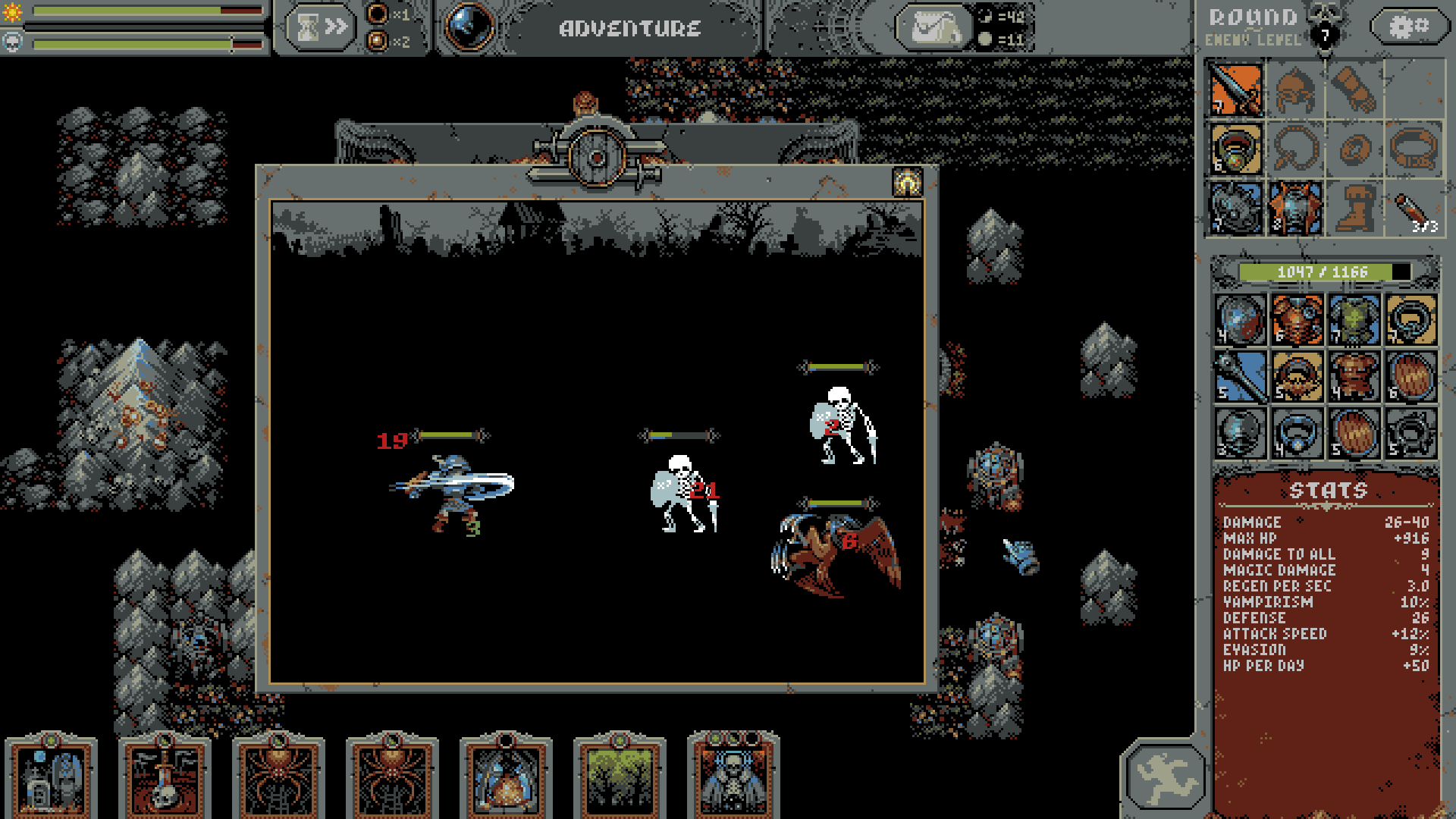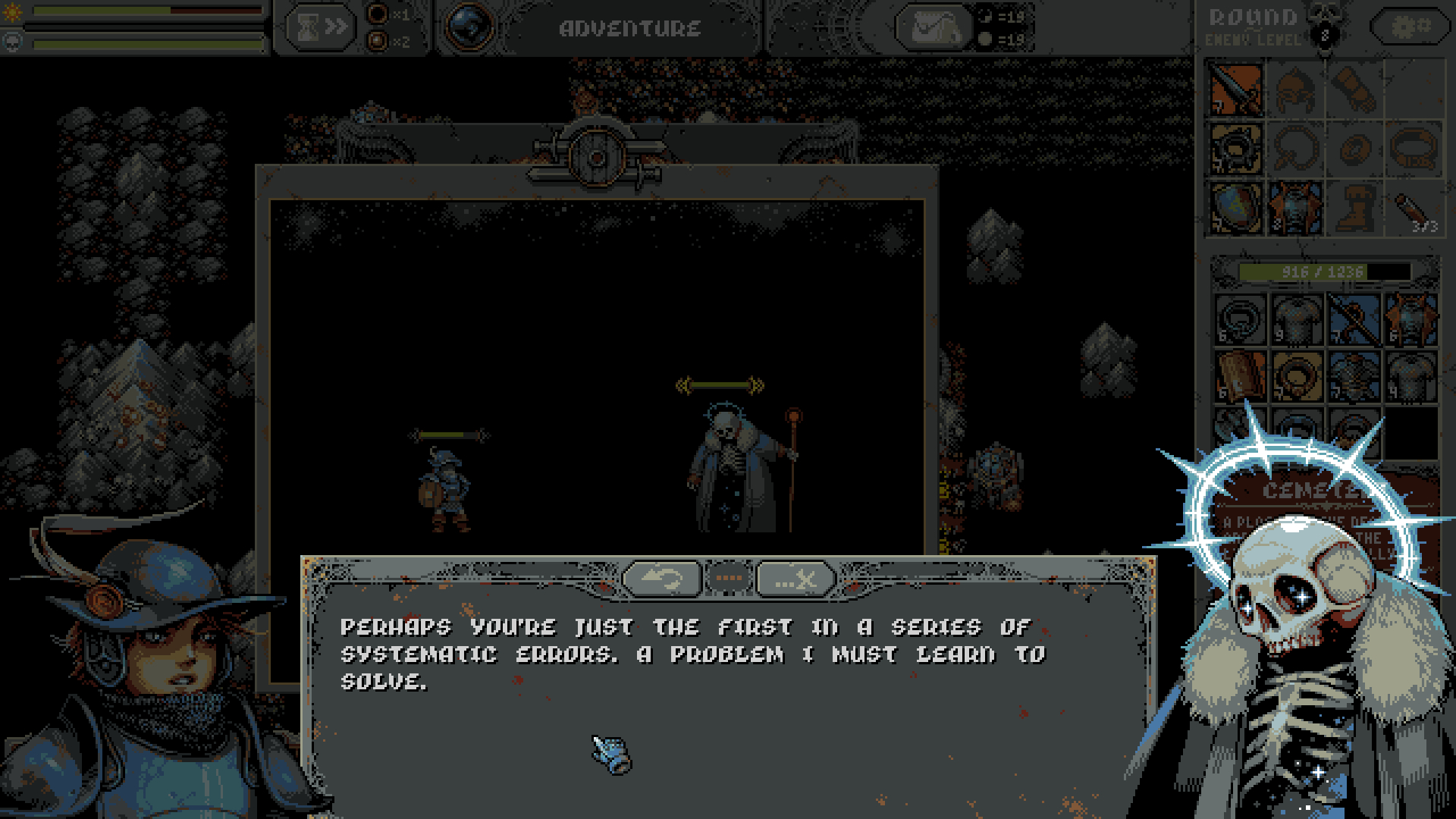Loop Hero is the year's first slam dunk
Loop Hero sits at an intersection between traditional roguelike, autobattler, deckbuilder, and match-3 puzzle game. It takes direct control of its hero away, but still expertly strums the pleasure center of my brain with every looted corpse. It's also friendlier than other roguelikes, such as Spelunky 2 with its ruthless platforming, and doesn't frustrate. The year is still young, but it’s my favorite game of 2021 so far.
As the name suggests, Loop Hero is about a hero who automatically and continuously walks in a loop, slaying monsters along the path. The player takes on a godlike role, taking the spoils of the hero’s battles in the form of terrain cards, armor, and weapons. Between battles, you can pause the action and spend terrain cards to beautify the black void surrounding the loop with meadows, mountains, and villages. This isn't just decoration: Tiles can boost the hero’s stats, spawn enemies, and even accelerate time, and you’re rewarded for assembling them in certain secret patterns on the map.
For instance, the HP boost of rock tiles stack with every adjacent rock or mountain around it. Even better, a 3x3 block of rocks and mountains creates a mountain peak that grants a major health boost and starts spawning harpies on the map. Descriptions on tile cards often allude to the ways they can combo with other cards, but I’m constantly discovering others that Loop Hero doesn’t spell out. Placing two Battlefield tiles on either side of a loop tile, for instance, spreads the effect to more tiles and spawns a unique enemy that drops high-tier loot.
You can’t directly control combat, but you do manage the hero’s loadout. Weapons and armor can be swapped around at any time. With the basic Warrior class, I’ve had my best runs slotting in gear that boosts health regen and attack speed, but I’m eager to dig deeper into evasion and counterattacks, something the Rogue excels at.
Loop Hero’s biggest strength is how it layers on complexity without ever overcomplicating itself. Its interactions couldn’t be much more passive for a videogame (it’s a great one-handed game), but the progression of a single run is mesmerizing. Like slow-cooking a huge pot of stew, Loop Hero is all about tossing in new ingredients to see how the flavor changes. And when it’s finally just right, it’s like you’ve gotten away with a delicious crime. The game isn’t afraid to make you feel overpowered.
That’s how I felt the last time I faced the game’s first boss, The Lich. With my vampirism and regen so high that no monster could scratch my hero, I was convinced that the Lich’s head would finally be mine. Yikes, was I wrong. The jerk slapped my sorry ass back to base camp. But that’s alright, because I got closer than ever before and see a clear path to kill him if I have better gear next time. Almost everything you do also generates supplies used to expand base camp and unlock dramatic upgrades that carry into your next run. I’ve barely penetrated the camp’s expansive upgrade tree and I’ve already unlocked talents, potions, and a new playable class.

I’m floored by how fundamentally Loop Hero changes from class-to-class. The Rogue introduces dual-wielding and critical hit chance while also remixing looting itself. Slaying enemies earns a “trophy” that only turns into loot after passing through the campfire once per loop. There’s also a Necromancer class that apparently starts out vulnerable and ramps up with an energy shield over time.
I’m not proud to admit that I choke in high pressure situations. The high stakes created by permadeath in roguelikes have a way of freezing me in place and deleting all of the mechanical skill I usually have. Loop Hero’s hands-off design makes it hard to completely screw yourself over. Winning in Loop Hero feels like an inevitability, not a miracle. That’s not to suggest it doesn’t take any skill. Building your deck of terrain cards alone requires some theory-crafting and you’ll live and die by wisely picking gear between battles.

It’s refreshing to play a roguelike that isn't out to crush me. I adore Spelunky, but its world is so sharp that it’s hard not to trip and die on something. Loop Hero’s world isn’t your friend, but it’s not actively working against you, either. You’re literally the architect of your own experience, meaning that you also build your own difficulty. For me right now, that means spending a few runs ignoring the boss and farming supplies instead.
Loop Hero is a brilliant piece of game design. Judging by the breezy seven hours I’ve already spent watching my little dude run in a circle, I could easily keep at it for a dozen more. There’s certainly no shortage of meaningful upgrades to pursue. Our own Evan Lahti has already moved onto Chapter 4, which he described as "a carnival of scary worms and ghosts-of-ghosts," so I have that to look forward to. It’s easily the coolest game to emerge in 2021 so far.
Loop Hero is primed to launch early this year.
from PCGamer latest https://ift.tt/3oDf8Du
Loop Hero sits at an intersection between traditional roguelike, autobattler, deckbuilder, and match-3 puzzle game. It takes direct control of its hero away, but still expertly strums the pleasure center of my brain with every looted corpse. It's also friendlier than other roguelikes, such as Spelunky 2 with its ruthless platforming, and doesn't frustrate. The year is still young, but it’s my favorite game of 2021 so far.
As the name suggests, Loop Hero is about a hero who automatically and continuously walks in a loop, slaying monsters along the path. The player takes on a godlike role, taking the spoils of the hero’s battles in the form of terrain cards, armor, and weapons. Between battles, you can pause the action and spend terrain cards to beautify the black void surrounding the loop with meadows, mountains, and villages. This isn't just decoration: Tiles can boost the hero’s stats, spawn enemies, and even accelerate time, and you’re rewarded for assembling them in certain secret patterns on the map.
For instance, the HP boost of rock tiles stack with every adjacent rock or mountain around it. Even better, a 3x3 block of rocks and mountains creates a mountain peak that grants a major health boost and starts spawning harpies on the map. Descriptions on tile cards often allude to the ways they can combo with other cards, but I’m constantly discovering others that Loop Hero doesn’t spell out. Placing two Battlefield tiles on either side of a loop tile, for instance, spreads the effect to more tiles and spawns a unique enemy that drops high-tier loot.
You can’t directly control combat, but you do manage the hero’s loadout. Weapons and armor can be swapped around at any time. With the basic Warrior class, I’ve had my best runs slotting in gear that boosts health regen and attack speed, but I’m eager to dig deeper into evasion and counterattacks, something the Rogue excels at.
Loop Hero’s biggest strength is how it layers on complexity without ever overcomplicating itself. Its interactions couldn’t be much more passive for a videogame (it’s a great one-handed game), but the progression of a single run is mesmerizing. Like slow-cooking a huge pot of stew, Loop Hero is all about tossing in new ingredients to see how the flavor changes. And when it’s finally just right, it’s like you’ve gotten away with a delicious crime. The game isn’t afraid to make you feel overpowered.
That’s how I felt the last time I faced the game’s first boss, The Lich. With my vampirism and regen so high that no monster could scratch my hero, I was convinced that the Lich’s head would finally be mine. Yikes, was I wrong. The jerk slapped my sorry ass back to base camp. But that’s alright, because I got closer than ever before and see a clear path to kill him if I have better gear next time. Almost everything you do also generates supplies used to expand base camp and unlock dramatic upgrades that carry into your next run. I’ve barely penetrated the camp’s expansive upgrade tree and I’ve already unlocked talents, potions, and a new playable class.

I’m floored by how fundamentally Loop Hero changes from class-to-class. The Rogue introduces dual-wielding and critical hit chance while also remixing looting itself. Slaying enemies earns a “trophy” that only turns into loot after passing through the campfire once per loop. There’s also a Necromancer class that apparently starts out vulnerable and ramps up with an energy shield over time.
I’m not proud to admit that I choke in high pressure situations. The high stakes created by permadeath in roguelikes have a way of freezing me in place and deleting all of the mechanical skill I usually have. Loop Hero’s hands-off design makes it hard to completely screw yourself over. Winning in Loop Hero feels like an inevitability, not a miracle. That’s not to suggest it doesn’t take any skill. Building your deck of terrain cards alone requires some theory-crafting and you’ll live and die by wisely picking gear between battles.

It’s refreshing to play a roguelike that isn't out to crush me. I adore Spelunky, but its world is so sharp that it’s hard not to trip and die on something. Loop Hero’s world isn’t your friend, but it’s not actively working against you, either. You’re literally the architect of your own experience, meaning that you also build your own difficulty. For me right now, that means spending a few runs ignoring the boss and farming supplies instead.
Loop Hero is a brilliant piece of game design. Judging by the breezy seven hours I’ve already spent watching my little dude run in a circle, I could easily keep at it for a dozen more. There’s certainly no shortage of meaningful upgrades to pursue. Our own Evan Lahti has already moved onto Chapter 4, which he described as "a carnival of scary worms and ghosts-of-ghosts," so I have that to look forward to. It’s easily the coolest game to emerge in 2021 so far.
Loop Hero is primed to launch early this year.
via IFTTT

Post a Comment